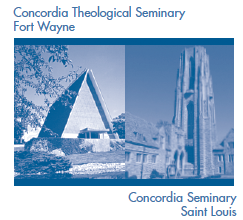
In the old days, mission work was almost as colonial as the politics of the developed nations toward the "third" world. The folks sharing the Gospel were also those who ran the mission church and they came as strangers to the culture and community in which they served. I say this not to impugn their motives or their great results but to frame the perspective on mission that once dominated the Church.
Today it is much more likely that the missionaries train the indigenous leaders who will themselves personally bring the Gospel to their communities around the world. In fact, the last few years have been particularly fruitful for the Missouri Synod in this regard. Our newest and most fruitful relationships with other church bodies have come not from dialogs toward altar and pulpit fellowship but from invitations from churches to come and help them train their Pastors and church leaders that they may do the work of the kingdom in their midst.
In Missouri we call this the Global Seminary Initiative. This has born many fruits not in the least of which is the new friendship between the Ethiopian Evangelical Church Mekane Yesus. It may or may not result in altar and pulpit fellowship but it will intertwine our futures in a significant way. In other cases, this has resulted in altar and pulpit fellowship (the Siberian Lutheran Church).
Few would deny our LCMS expertise in the areas of seminary education and training. Our history of education (on all levels – elementary, secondary, and collegiate) leaves us uniquely situation to provide these services to those seeking them. In this way we have the opportunity to broadly expand our reach and influence for the cause of confessional Lutheranism. Now is the time for us to fund this endeavor more fully so that its fruits may be born here and there. Right now the whole global initiative has a $1.2 million dollar budget – smaller than many of our medium and large congregations and schools at home.
At the July Synod convention, the LCMS approved this direction but it will not flourish until we in the congregations and as Lutheran individuals get behind it. This is not checkbook evangelism but providing the resources for a fruitful and influential process by which the cause of truth and orthodoxy within Lutheranism may be fostered.
At my own Mid-South District Convention we cemented our partnership with the Lutheran Church in Tanzania (Southeast of Lake Victoria Diocese) by providing funds so that their Pastors could make their way to one of our seminaries and receive further training. Though individual congregations (like mine) will continue to partner in brick and mortar work, the long term future will be sealed less by money than by sharing a common faith and confessing together what it is we believe, confess, and teach. The more we can bring Pastors to our seminaries and strengthen not only the educational background but foster the personal relationship, the better the ecumenical future for both sides of this equation.
I would merely observe that where the LCMS was once the lonely and solitary path have found us suddenly on the cutting edge of the ecumenical endeavor – not because we abandoned our confessional integrity but precisely because of it! Now this is a place Missouri has seldom found itself and it is a good place to be. I hope and pray we do not fail to resource this opportunity so that the Lord may bring to harvest the seeds that are sown by this mission effort! |